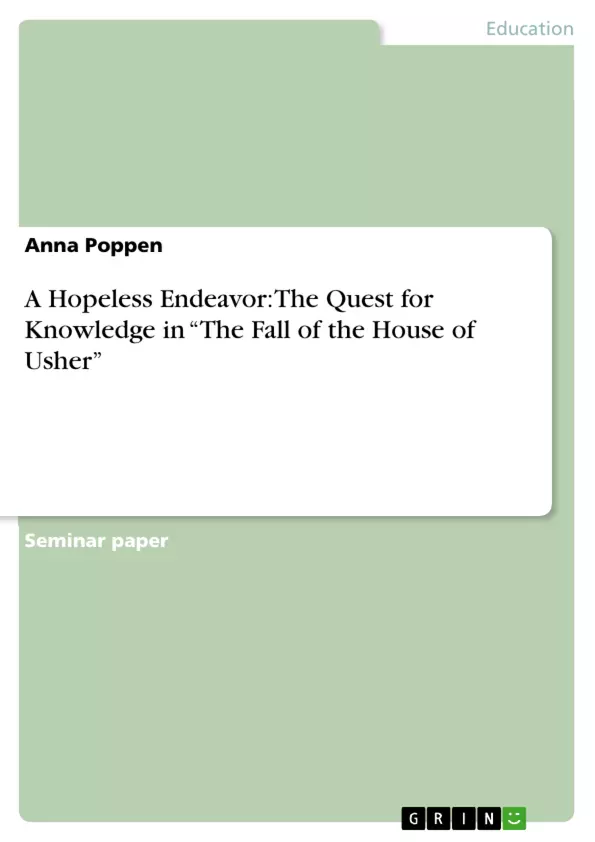The short story “The Fall of the House of Usher” is one of Edgar Allan Poe’s most popular and most interpreted texts. Up to today, literary scholars argue about the proper meaning of the story. The text has been interpreted as a story of the supernatural, a tale of insanity, as a representation of romantic art, as a vampire story or as a text about incestuous love. Most interpretations aim at finding answers to the major questions raised in the short story. Scholars have tried to find reasons for the crash of the mansion, for Roderick’s disease, for Madeline’s death, for the supernatural vapour around the house, and many other issues that the story leaves open. However, a general answer to all the questions has not yet been found. In the following, I will prove that it is not necessary to find an answer to the inexplicable elements of the text, because they are part of the story’s message. The chaotic, nonsatisfying ending of “The Fall of the House of Usher” is intended, because the story is about the difficulty or even impossibility of explaining the world. That is why Poe’s short story “The Fall of the House of Usher” can be interpreted as part of what Hagenbüchle termed “the epistemological crisis in nineteenth-century American thought”. Using the example of Charles Brockden Brown’s Wieland, Hagenbüchle argues that at the beginning of the 19th century the foundations of human knowledge were questioned and fell apart. This thesis can be applied to other American authors besides Brockden Brown who also challenged established epistemological assumptions. In the following, I will argue that Edgar Allan Poe shows the limits of epistemology by creating characters who try to acquire knowledge through different approaches, but fail in the end. By doing this, he responds to his cultural and historical background and presents a rather pessimistic view of the American nation. In order to place the short story in its cultural context, the following text will first deal with Poe’s role in the post-Enlightenment era and the influence of the American context on his writings. In a second step, I will describe the most important characteristics of different theories of epistemology up to the beginning of the 19th century so as to locate Poe within these theories of knowledge. In order to do so, the role of different epistemological approaches in the short story will be examined.
Inhaltsverzeichnis (Table of Contents)
- Introduction
- Cultural and Epistemological Background of “The Fall of the House of Usher”
- Historical and Cultural Background
- Concepts of Epistemology in the 17th and 18th Century
- The Quest for Knowledge in “The Fall of the House of Usher”
- The Failure of Rationalism
- The Failure of Anti-Rationalism
- Poe's Version of the Sublime
- Conclusion
Zielsetzung und Themenschwerpunkte (Objectives and Key Themes)
This paper aims to analyze Edgar Allan Poe's short story “The Fall of the House of Usher” as a reflection of the epistemological crisis in 19th-century American thought. By examining the characters’ attempts to acquire knowledge through various approaches, the paper argues that Poe depicts the limitations of human understanding and presents a pessimistic view of the ability to comprehend the world.
- The epistemological crisis in 19th-century American thought
- The limitations of rationalism and anti-rationalism in understanding the world
- The role of the sublime in revealing the shortcomings of human knowledge
- The pessimistic view of the American nation's ability to grasp reality
- Poe's literary techniques in conveying his philosophical arguments
Zusammenfassung der Kapitel (Chapter Summaries)
The Introduction establishes the context for analyzing “The Fall of the House of Usher” by highlighting its enduring popularity and its multifaceted interpretations. The chapter explores the ambiguity of the text and its open-ended nature, suggesting that the story's meaning lies in its refusal to provide definitive answers.
The second chapter delves into the cultural and epistemological background of the story. It examines Poe's position within the context of post-Enlightenment America, highlighting the influence of Romanticism and Gothicism on his work. The chapter also explores the key concepts of epistemology in the 17th and 18th centuries, outlining the philosophical frameworks that influenced Poe's thinking.
The third chapter focuses on the quest for knowledge in “The Fall of the House of Usher.” It examines the characters’ attempts to understand the world around them through different epistemological approaches, specifically rationalism and anti-rationalism. The chapter analyzes the failures of these approaches and explores the role of the sublime in exposing the limitations of human knowledge.
Schlüsselwörter (Keywords)
Key terms and topics explored in this paper include: “The Fall of the House of Usher”, Edgar Allan Poe, American Gothicism, epistemology, rationalism, anti-rationalism, the sublime, 19th-century American thought, literary interpretation, and the limitations of human knowledge.
Frequently Asked Questions
What is the central thesis regarding Poe's "The Fall of the House of Usher"?
The paper argues that the story represents the "epistemological crisis" of the 19th century, highlighting the impossibility of fully explaining or knowing the world.
Why do the characters in the story fail in their quest for knowledge?
Poe shows the limits of human understanding by creating characters whose rational and anti-rational approaches to acquiring knowledge both fail in the end.
What is the "epistemological crisis" mentioned in the abstract?
It refers to a period in 19th-century American thought where the foundations of human knowledge were questioned and established assumptions began to fall apart.
Is there a definitive answer to the mysteries in the House of Usher?
No; the paper posits that the inexplicable elements are intentional and serve to illustrate the limits of epistemology.
How does Poe relate to the post-Enlightenment era?
Poe responds to his cultural background by presenting a pessimistic view of the human ability to grasp reality, contrasting with Enlightenment optimism.
- Quote paper
- Anna Poppen (Author), 2012, A Hopeless Endeavor: The Quest for Knowledge in “The Fall of the House of Usher”, Munich, GRIN Verlag, https://www.grin.com/document/278563



